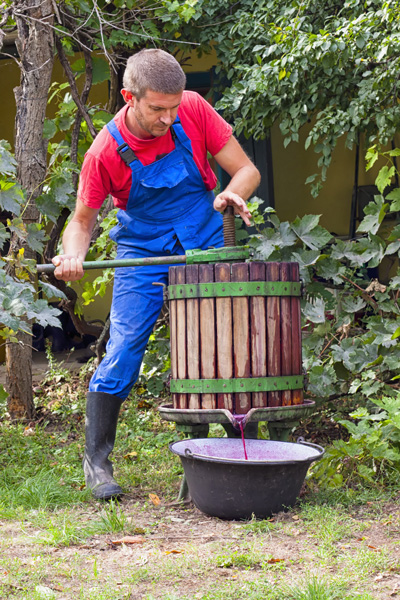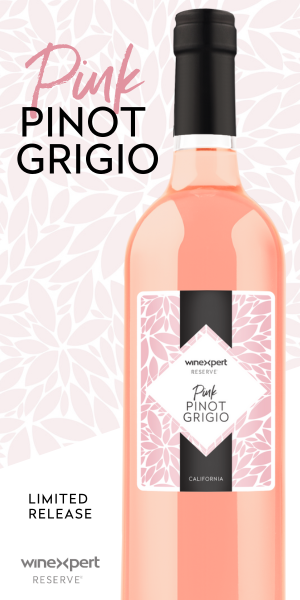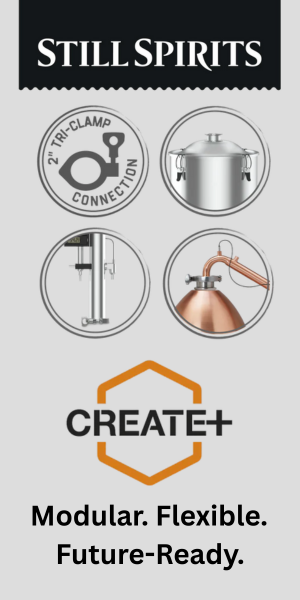Pressing Issues
Q: This past weekend I crushed and pressed two cases of Riesling grapes in my screw-type basket press and my yield of juice was not quite 4 gallons (15 L). The grape skins left in the basket after pressing seemed heavy with remaining juice despite my maximum effort at the press over an extended time. I’ve noticed that I get far more juice from my macerated red grapes (5+ gallons/19+ L per two cases) but maceration isn’t recommended for most white grapes per the references I use for my winemaking. Are there any solutions to improve juice yield when pressing white grapes? I’ve read about adding rice hulls to improve flow. It’s been suggested to me to (1) actually do a cold (40 °F/4 °C) maceration for a few days, (2) try freezing the grapes first, (3) buy a pneumatic press, or (4) give up on pressing white grapes and just buy juice. What would you suggest?
— Jim Skufis • Ann Arbor, Michigan
A: You’ve hit on one of the classic difficulties of making wine at home. The equipment we use, from presses to barrels to filters, usually are much smaller than that used by commercial wineries. Yet the size of the grapes and the job we need our equipment to do remain the same. Getting a better press yield out of grapes, both red and white, is tough for home winemakers. The presses are smaller and, especially with hand-operated basket presses, there’s only so much force we can apply to the grapes. Your tale of wet, heavy grape skins tells me that indeed you did leave a lot of juice behind.

Fortunately, there are a few things that small-scale winemakers can do to improve juice yields. Think about using a maceration enzyme for white grapes. Enological enzymes are naturally occurring proteins that, when added at the crush stage and before pressing, can help break down the cells in the grape skin and pulp, which improves the press’s ability to release juice. Bottles of enzyme can be purchased from commercial winery labs like Scott Labs, Laffort USA, and AEB, but it might be better to try to source them through home winemaking supply businesses because chances are you’ll be able to buy them in smaller quantities. Products (and their concentrations) vary but it’s likely you’ll need less than 50 mL for the small-scale kind of winemaking you’re doing. Just be sure that the enzyme is fresh and has been stored properly. Age and exposure to UV light and high temperatures can all degrade an enzyme’s efficacy. Additionally, be sure to follow the manufacturer’s instructions exactly as too high of a dose can turn a batch of grapes into mush, an even more difficult prospect to press!
You’re absolutely correct that rice hulls, the papery outer shell that coats a grain of rice, can also be added in order to help increase juice yields. They work by helping to break up the gloppy “cake” of grapes in the press, providing miniature channels through which the juice can escape. I’ve used rice hulls in the past when pressing raspberries, and trust me, I used a lot of rice hulls! In your case with your press, I would layer handfuls of rice hulls into your basket press as you load it up with grapes. Luckily, rice hulls are inexpensive and can be found at most winemaking-homebrew supply stores (homebrewers commonly use rice hulls), well-stocked hardware stores, feed stores, and gardening centers (or online). If you don’t use all of the rice hulls, they can be stored for later use or they make great soil amendments for your compost pile or vegetable beds where they perform essentially the same function, providing air and friability for heavy or wet soils. Rice hulls work equally well for red (after fermentation is complete) or white (before fermentation) grapes as they are flavor-neutral and won’t leach anything harmful into your juice or wine.
You might also want to try using a press aid that you most likely were just throwing away: Grape stems. By destemming only a portion of your grapes (say 2⁄3 only) you’ll leave 1⁄3 of the grape clusters intact. When you load up your press (especially if you also use rice hulls) you’ll create plenty of internal juice channels through which your Riesling juice can escape. Just be careful of excess contact time with grape stems, as they are full of bitter, tannic compounds. If you have to leave your grapes in the press overnight for some reason, your juice risks picking up some of these compounds. If you plan to destem and press in one go, say over the course of a few hours, you should be fine. This is what winemakers mean when they use the terms “direct to press” or “whole cluster press” — you just dump the grapes in the press and go for it.
I don’t think I’d do a cold maceration on the grapes — again, you’d just be creating a lot of skin contact — and skin contact and white winemaking don’t really go well together. In my early winemaking career, I was working for a California winery, which shall remain nameless, in which the owner was a very, shall we say “adventurous” winemaker. He wanted us to take 12 tons of top-quality Riesling and do three days of skin contact before we pressed it, I think in a bid to get more of the “interesting” aromatics from the skin into the wine. The only interesting thing that resulted was that we ended up making 12 tons worth of light brown, tannic Riesling that we eventually had to sell for distillation material. In other words, I’m not a fan of white grapes and skin contact.
Freezing the grapes first is an interesting idea, and one that scientifically, at least, could make some sense. By freezing the grapes you’ll be breaking down the texture (cell structure) of the grapes. You’d also be increasing the skin contact time so you really need to assess if this is a character you want in your final wine. Furthermore, you’d have to have some serious freezer capacity to even attempt to do this. I think you’d get similar results by using a maceration enzyme and it’d be a lot easier to administer.
Don’t forget you can also add water to make up batch volume, but you do run the risk of diluting everything too much. Juice for winemaking needs to have the right mix of sugars, acids, yeast nutrients, and taste and aroma compounds. Too much water will throw that out of balance. If you press with all your might and still want to get some more volume, you could try supplementing the juice you do get with concentrate from a kit. There’s nothing wrong with reconstituting some frozen wine grape juice to help out your batch a little bit. Especially with an aromatic variety like Riesling, if you put in a little Chardonnay or even Thompson’s Seedless, it’s unlikely to detract from the character of the batch too much. Just make sure that you use a variety of concentrate that’s compatible with the wine you want to make. In your case, any neutral white grape concentrate should be fine. You can use concentrate to boost batch volume, color, or sugar when making red wines too. Cabernet Sauvignon concentrate is a great match for other big red Bordeaux wine grapes like Merlot, Cabernet Franc, or Malbec, or even your Syrah or Sangiovese type of grapes. I’d stick with a lighter “Gamay-type” red concentrate for lighter weight reds like Pinot Noir.


